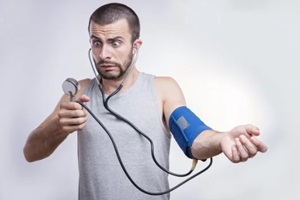 Hypertension, colloquially referred to as high blood pressure, is a dangerous health concern if left untreated. Blood pressure is the strength with which blood pushes against your artery walls as your heart pushes blood through your body. Hypertension refers to a chronic elevation of this pressure.
Hypertension, colloquially referred to as high blood pressure, is a dangerous health concern if left untreated. Blood pressure is the strength with which blood pushes against your artery walls as your heart pushes blood through your body. Hypertension refers to a chronic elevation of this pressure.
Recognizing and properly addressing hypertension through lifestyle changes and medication therapy when needed is essential for protection from adverse cardiovascular events as well as premature mortality.
Normal Blood Pressure
Normal blood pressure is defined as a measurement below 120/80 mmHg. This is measured as systolic blood pressure (the first, higher number) over diastolic blood pressure (the second, lower number).
- Systolic represents maximum pressure in arteries as the heart muscle squeezes and pumps blood to body tissues.
- Diastolic reflects minimum pressure as the heart rests between beats to take in more blood.
Maintaining diastolic and systolic blood pressure at healthy levels keeps tiny arterial blood vessels flexible and resilient under changing pressures. This protects organs all over the body from avoidable damage due to forcefully elevated blood flow over time.
Elevated Blood Pressure
The first stage above normal is called elevated blood pressure. This means:
- Systolic pressure ranging from 120 to 129 mmHg
- Diastolic below 80 mmHg
Though not yet to the level considered officially hypertensive, it is a warning sign. Many studies show that even modest elevations in systolic blood pressure, if not lowered through lifestyle changes, often progress over months and years into full hypertension.
At the elevated blood pressure stage, the heart has already begun working harder than usual to pump against the growing resistance in blood vessels. Over time, without intervention, this adds strain, stiffening arterial walls more and more until blood pressure readings enter dangerous ranges.
The main goal is to lower pressure through better nutrition, weight loss, exercise, and stress relief rather than waiting until medication becomes mandatory.
Stage 1 Hypertension
When blood pressure remains elevated above 130/80 mmHg across repeated screenings spanning weeks to months, despite lifestyle changes, Stage 1 hypertension is diagnosed. This indicates:
- Systolic pressure of 130 to 139 mmHg
- Diastolic pressure of 80 to 89 mmHg
Though most have no symptoms in earlier stages of hypertension due to the body slowly adapting to pressure changes, internal damage still accrues. At Stage 1, physicians strongly suggest adding blood pressure medication to protect important organs and ensure readings don’t keep creeping higher into later stages that pose far greater risks.
 Even if symptoms such as shortness of breath, headaches, or nosebleeds finally do appear, it often takes aggressive medication therapy for six months or longer alongside continued diet and lifestyle improvements to restore healthy blood pressure.
Even if symptoms such as shortness of breath, headaches, or nosebleeds finally do appear, it often takes aggressive medication therapy for six months or longer alongside continued diet and lifestyle improvements to restore healthy blood pressure.
The overall goal of treatment is keeping systolic pressure below 130 mmHg at a minimum since this reading is most strongly tied to future heart attack and stroke risk.
Stage 2 Hypertension
Stage 2 hypertension develops when hypertension is uncontrolled and blood pressure is allowed to keep rising over time without early monitoring and intervention. This is defined by extremely elevated pressure:
- Systolic pressure of a minimum level of 140 mmHg
- Diastolic pressure of a minimum measurement of 90 mmHg
Such high pressure chronically puts fragile blood vessels in danger of rupturing and essential organs such as the brain, heart, and kidneys at exponentially greater risk of damage.
Without correcting their blood pressure at this advanced stage, a significant number of people will go on to suffer heart attack or stroke or develop heart failure or kidney damage within a relatively short timeframe of a Stage 2 hypertension diagnosis.
Therefore, aggressive blood pressure monitoring and tight control through physician-directed combination therapies of diet, exercise, stress reduction, and often multiple medications in tandem become mandatory for preventing life-threatening health issues.
Lifestyle interventions remain important but are rarely enough on their own to overcome the pressure buildup caused by arterial impairment over such a long duration of hypertension. Lifelong pressure regulation is needed.
Hypertensive Crisis
The most severe, immediately dangerous manifestation of untreated hypertension is a hypertensive crisis. Numbers defining this dangerous state are:
- Systolic pressure at 180 mmHg or over
- Diastolic pressure at 120 mmHg or above
Rather than gradual elevation over the years, pressure spikes suddenly and severely enough that people may experience:
- Serious headaches
- Trouble breathing
- Nosebleeds
- Pain in the chest
- Pounding heart rate
- Anxiety
- Vision impairment
Without emergency medical intervention to rapidly get pressure below 160/100 mmHg, a hypertensive crisis can quickly lead to permanent disability or death in days or even hours due to an aneurism or catastrophic damage to the brain, heart muscle, coronary arteries, or kidneys.
Examples of acute events include a tear or blockage of an artery feeding blood to the brain (hemorrhagic or thrombotic stroke), blood leaking into brain tissue, heart rhythm abnormalities, heart attack, acute kidney failure, and more. Those who survive the initial crisis may still suffer chronic illnesses going forward.
Improve Your Cardiac Health with Imperial Center Family Medicine Starting Today
 High blood pressure is preventable yet responsible for nearly half of cardiovascular deaths in America yearly. Because hypertension has earned a reputation as “the silent killer,” people must be proactive about screening and never assume they are not at risk based on feeling fine or being younger.
High blood pressure is preventable yet responsible for nearly half of cardiovascular deaths in America yearly. Because hypertension has earned a reputation as “the silent killer,” people must be proactive about screening and never assume they are not at risk based on feeling fine or being younger.
Catching and lowering elevation early, before organs face irreversible damage, is the best way to improve long-term outcomes.
Imperial Center Family Medicine’s team is passionate about complete cardiovascular care, prevention, and optimal management of chronic conditions such as hypertension that can significantly impact quality of life when left unchecked.
Contact us today at 919-873-4437 or online to book your appointment, as investing in prevention now leads to better health for years ahead.
